Vietnam and the Netherlands working together to improve the quality of tropical fruit
With the application of smart agricultural practices Vietnamese farmers can achieve substantial improvements of the quality while increasing yields and income. Reduced use of inputs will not only save money but also reduce the impact on the environment. The project ‘Improving Quality of Tropical Fruit Vietnam’, implemented by Vietnam Farmers’ Union in close collaboration with MCNV, targeted key production areas of dragon fruit (Long An, Binh Thuan), mango (Dong Thap) and pomelo (Ben Tre). Farmers got extensive guidance of partners from the Netherlands. Execution of the project started in 2022 and will end December 2024.
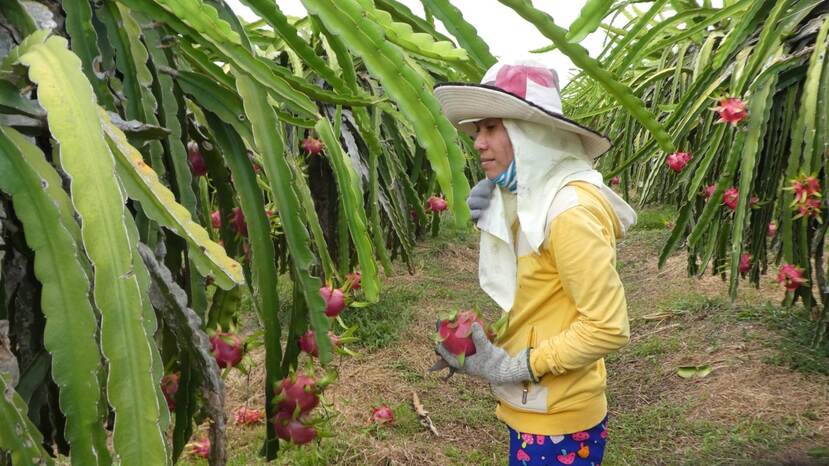
Fruit sector in Vietnam
In the past Vietnamese fruit had a bad reputation among importers in Europe. Often the residue limits of crop protection agents were exceeded, and the shelf life of the fruit was not good enough. Long time farmers tend to overuse chemical inputs for fertilization and crop protection. Consequence of the application of too many fertilizers is not only a saturated soil and poor quality of the fruit, but also environmental losses. Moreover, farmers spend too much money.
The last 20 years the acreage dragon fruit increased from a few hundreds of hectares in 2003 to more than 55,000 hectares in 2018, without keeping a strong connection with the demand. Vietnamese farmers depend a lot on the Chinese market for their sales. Unfortunately, China also started to grow dragon fruit. As a result, the market collapsed and prices at the farm gate dropped dramatically. COVID had a severe influence on the prospects of farming. Transportation costs and shipping times increased substantially. The changes had influence on the prices but also on the attitude of farmers. Farmers didn’t fertilize their trees to save money. The soil fertility reduced, and trees were not pruned. Farmers even abandoned their orchards.
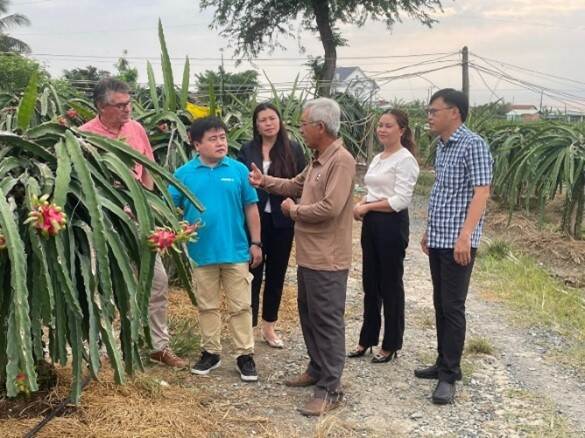
Project bundles expertise leading companies
In the project ‘Improving Quality of Tropical Fruit Vietnam’ various partners were involved aiming at implementation of an integrated approach. As a Dutch-Vietnamese NGO, MCNV took the lead in this initiative. Vietnam Farmers’ Union (VNFU) ensured access to the local stakeholders and farmers’ networks. Dutch and Vietnamese companies offered services and inputs and Dutch experts supported the lead partners with the project implementation.
Model of knowledge dissemination
VNFU selected 5 key-farmers who were willing to host the demos. In Ben Tre two locations of pomelo were identified. In each province a study group of 25 farmers was formed as a mean for intensive exchange of knowledge. The farmers gathered at the demo locations to discuss various aspects of cultivation. Consortium partners and external experts instructed the farmers and discussed results in the fields. This way of learning inspired the farmers. On request of the participants more meetings were offered than foreseen. Fruit Tech Innovation Days were organized to be able to share the lessons learned with a bigger group farmers and other interested stakeholders from the private sector and local government. Early 2024 the growers of pomelo and mango presented their results to interested commercial parties during Harvest Days.
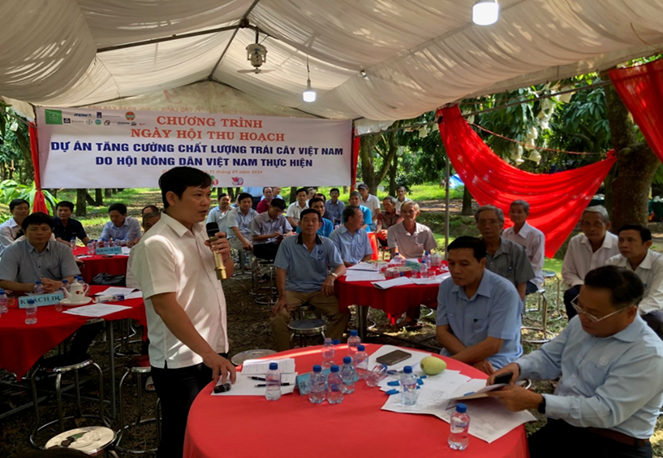
Soil test basis for accurate fertilization
Most farmers in Vietnam fertilize their crops, based on gut feeling and tradition. When commercial fertilizer suppliers recommend application rates, it is in most cases not based on the actual fertility status of the fields. Rarely a farmer sends a sample of the soil for lab analysis. Current soil testing services are offered by the government. Procedures take much time and are considered expensive. Modern technology based on Near Infrared Spectroscopy (NIRS) is innovative and offering an alternative for large scale analysis, because it is affordable, reliable and quick. Eurofins Agro (The Netherlands) is world leading is the development of this method, which is basically a scan of a prepared sample in a central lab. In previous years Vietnamese farmers already showed much interest in this innovative test. One device in Vietnam could easily process 1,000-2,000 samples per day, which would be a huge leap forward to transform farming in Vietnam to a data driven and climate smart agricultural production system. Eurofins invested in a NIRS-machine in their subsidiary in Vietnam, with financial support of the project. In the project YARA advised farmers the right amounts of fertilizers, based on the test results.
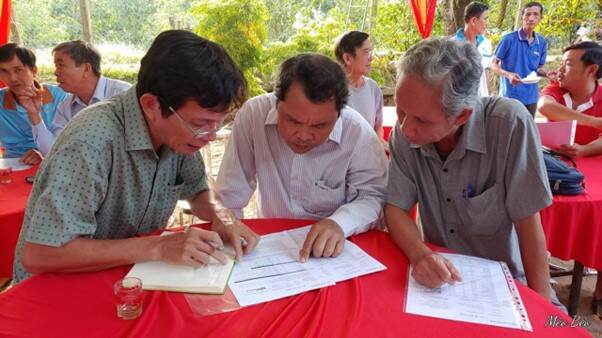
Clean fruits and higher yields
The key-farmers adopted the promoted technology. In all cases the fertilization strategy was improved, leading to a reduction of applied amounts. Two farmers started to get experience with a dripping system. The mango farmer used the irrigation system also for the application of fertilizers (fertigation). Guided by Bayer Vietnam the farmers implemented principles of Integrated Pest Management, resulting in a reduction of the application of chemical crop protection agents. Focus on the importance of healthy soils opened the eyes of the farmers to pay more attention to compost, organic manure and green cover crops. Emphasis on farm hygiene included also pointing on adequate pruning and removal of branches. The fruits were tested on residues of chemicals after the harvest. Conclusion was that the fruit was clean. The farmers became aware of the possibility to reduce the use of fertilizers when based on a soil test. The mango grower reduced his application rate with 30 % while doubling his yields and income. The fruit was of a more uniform quality. Unfortunately, the market situation and weather conditions for pomelo and dragon fruit were bad, which resulted in less convincing financial outcomes. However, the farmers involved in the project appreciated the gained knowledge and emphasized the potential benefits in the future.
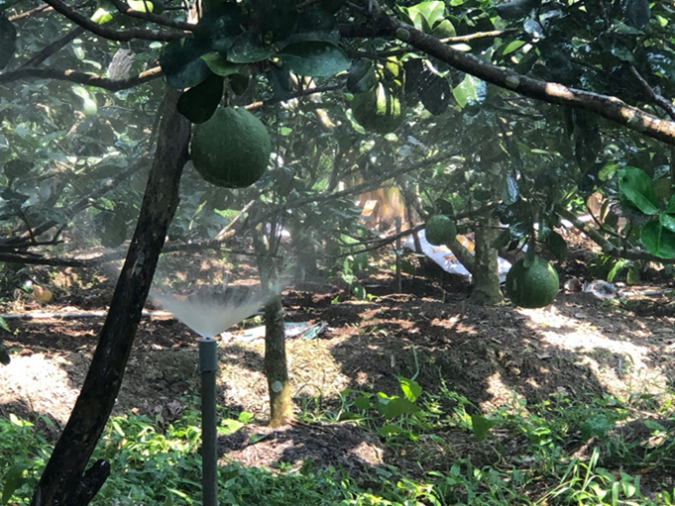
Strengthening the market power of farmers
Till the start all the farmers participating in the project sold their harvest to middlemen, without knowing the destination and market requirements. In the project farmers and their leaders were informed about standards and certification schemes. Exporters were introduced to the farmers and shared their vision and needs. Agriterra (Netherlands) was invited to share experiences on bundling the market power, for instance by establishing modern, professional managed cooperatives. The presentations inspired the farmers to deepen the benefits of being better organized as a producers’ group. The foundation is laid.
Suboptimal water management causes stress and diseases
Farm water management in the Mekong Delta is mainly based on flooding and natural discharge of water. Source of the water is the Mekong River and its branches. Saltwater intrusion in the main river system can lead to intake of saline water for irrigation. When affected with salts, the soil structure and fertility will become worse, hampering root development and crop health. High groundwater tables also limit root development. In the project, Royal Eijkelkamp installed sensors to monitor the groundwater table and salinity during the whole growing season. Conclusion was that the groundwater table can rise to almost 30 cm below the surface of the field, meaning that the rootzone will be anaerobic, which is bad for soil life and the uptake of nutrients. The trees will face stress and will be more vulnerable to pests and diseases. Subsurface drainage or controlled drainage systems could be solutions for better control groundwater table.
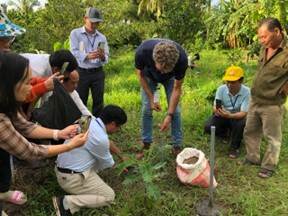
Structural impact within reach
Vietnamese farmers are eager to adopt suitable technology and improve their practices. Vietnam Farmers’ Union showed their interest in soil testing and is convinced about the benefits for farmers. The farmers’ organization committed itself to promote the test method among the 11 million farmers in Vietnam. Exporters became enthusiastic about the results of the key farmers and their peers. Collaboration with leading agro-input companies also has the potential to rolling out an approach focusing on smart and climate resilient production.
The project was funded by RVO and supported by the Embassy of the Netherlands in Vietnam. Contact for more information the coordinator Peter Prins (Land Water Food Consult BV, peter@landwaterfood.com).
Contact
Do you have any questions for the agriculture department please send an email to HAN-LNV@minbuza.nl. For the latest updates, news funding opportunities and more, follow us on Twitter @AgroVietnam and LinkedIn Netherlands Agricultural Network in Vietnam.